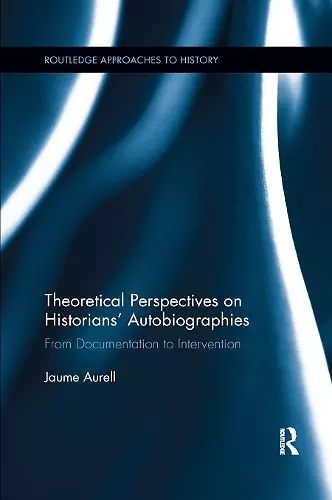Theoretical Perspectives on Historians' Autobiographies
From Documentation to Intervention
Format:Paperback
Publisher:Taylor & Francis Ltd
Published:10th Dec '19
Currently unavailable, and unfortunately no date known when it will be back
This paperback is available in another edition too:
- Hardback£160.00(9781138934405)

E. H. Carr wrote, "study the historian before you begin to study the facts." This book approaches the life, work, ideas, debates, and the context of key 20th- and 21st-century historians through an analysis of their life writing projects viewed as historiographical sources. Merging literary studies on autobiography with theories of history, it provides a systematic and detailed analysis of the autobiographies of the most outstanding historians, from the classic texts by Giambattista Vico, Edward Gibbon and Henry Adams, to the Annales historians such as Fernand Braudel, Philippe Ariès and Georges Duby, to Marxist historians such as Eric Hobsbawm and Annie Kriegel, to postmodern historians such as Carolyn Steedman, Robert A. Rosenstone, Carlos Eire, Luisa Passerini, Elisabeth Roudinesco, Gerda Lerner and Sheila Fitzpatrick, and to "interventional" historians such as Geoff Eley, Jill Ker Conway, Natalie Davis and Gabrielle Spiegel. Using a comparative approach to these texts, this book identifies six historical-autobiographical styles: humanistic, biographic, ego-historical, monographic, postmodern, and interventional. By privileging historians' autobiographies, this book proposes a renewed history of historiography, one that engages the theoretical evolution of the discipline, the way history has been interpreted by historians, and the currents of thought and ideologies that have dominated and influenced its writing in the 20th and 21st centuries.
The project that Aurell has undertaken here is an interesting and important one, concerned as it is with exploring the relationship between the changing ways in which historians have written about their lives and the developments within history as a discipline. The emphasis on autobiography as a form of historiography adds something useful and new to this whole discussion, by turning the attention of readers to the different kinds of historical inquiry and approach that different autobiographies contain. It complements the insistence that in writing their autobiographies, historians are engaged in a negotiation with history that “subverts and complements traditional monographs, posits the ‘subjective’ as an effective form of knowledge and acknowledges the constructed nature of the text” (259).
-Barbara Caine, University of Hawai'i Press
ISBN: 9780367872892
Dimensions: unknown
Weight: 453g
280 pages